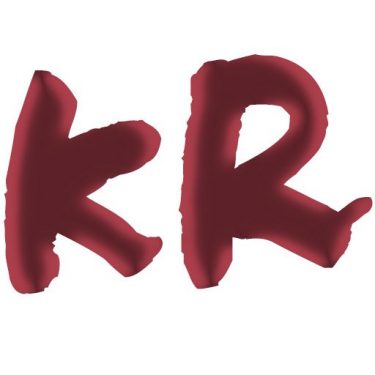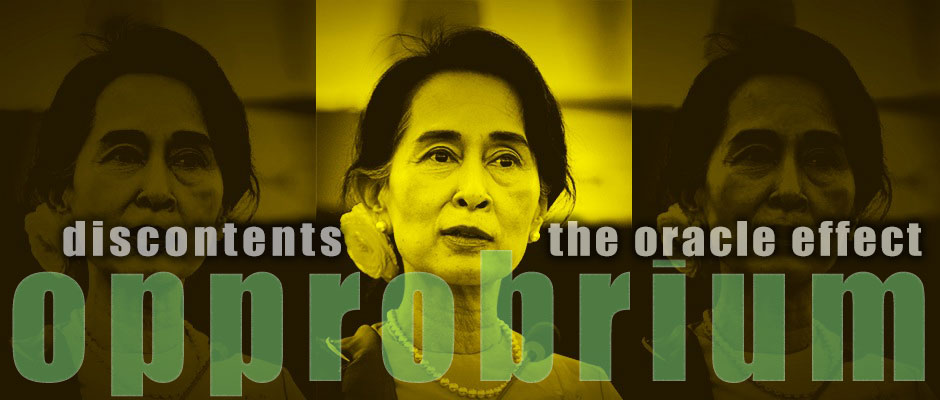A strange thing has occurred as Burma’s current political transition rolls on toward its unknown destination: the world’s most beloved human rights icon has turned into an object of widespread opprobrium. Indeed, a glance through opinion stories over the past year makes one wonder if there is anyone in Burma taking more abuse than democracy icon Daw Aung San Suu Kyi (DASSK)? While she is still feted on her various and continual international jaunts, it is President Thein Sein who has received the accolades during this period, 1 being labeled the “listener in chief.” 2 DASSK, on the other hand, has been lambasted in the international press for what seems to be her refusal to espouse human rights principles now that she is in parliament. 3 More importantly, criticism is emerging from within the country: whether it is famers near the Letpadaung copper mine ridiculing her incoherent reasons for endorsing their dispossession, 4 Muslim activists saying she has abandoned them in their time of need, 5 Kachin minorities calling her out at public events, 6 intellectuals in Yangon complaining of her autocratic ways, 7 or even members of her own party grumbling about her fixation on changing the constitution to enable her presidential run, 8 the pillorying of DASSK is also a homegrown phenomenon. What explains this?
Silences, equivocations, and empty mumblings about the ‘rule of law’
At first glance, the reason for the reproach seems easy to ascertain: DASSK had long implored the world to use its liberty to promote hers/her country’s … but then at the first opportunity to use her own relative power to stand up for those worse off than she, DASSK provided only silences, equivocations, and empty mumblings about the ‘rule of law’. 9 Hence the cry of hypocrisy, and beneath it perhaps a bit of despair at another messianic promise of human rights rendered false: one of the world’s prime exponents of human rights seems to not only expose its fundamental emptiness (evidenced through her inability or unwillingness to transmute HRs principles into practical politics that defend the marginalized), but also demonstrate how that emptiness can mask not-so-progressive political orientations.
All this said, given the reverence held for DASSK in Burma over the past two decades, we might expect a complete public capitulation to the convenient narrative that she is merely placating disgruntled generals and picking her fights. 10 And while many in Burma are giving her this benefit of the doubt, it is the fact that many have broken ranks, some vociferously so, that warrants deeper examination.
What we may be witnessing here is the inherent tension in what sociologist Pierre Bourdieu called “the oracle effect” in politics. 11 This, put somewhat reductively, is the idea that for the needs of many to be brought to bear in the political realm, there is often a two-part move in which “first, the [re is a] transition from atomistic subjects to the bureau, and second, [a] transition from the bureau to the secretary. ” 12 In other words, first individuals form a group which represents them, and then they install a particular representative to speak for this group. When this group was “the people of Burma” opposing a military state, their representative was Aung San Suu Kyi. And because that binary opposition of people versus military encompassed the political realm, DASSK could legitimately claim to stand for the Burmese people in this particular relationship. Her heartbreaking and compelling sacrifices (her house arrest, for instance) mirrored those of the Burmese people (a metaphorical imprisonment at the hands of a despotic military). 13 And so while DASSK’s claim that “icon was a depiction that was imposed on me by other people” 14 may be true, it can also be true that, against her protestations otherwise, she took on the icon status over the years, to the point where it became part of her habitus – her way of behaving and living in the political world.
But now that the political opportunity structure in Burma has started changing – the parameters of politics are now not entirely defined and circumscribed by the military – the ability for one figure to adequately describe and advocate for the needs of the Burmese people writ large is dissolving. Yet the oracle still universalizes her particular perspective on the political world, still believes that she defines and embodies the needs of the group. As Bourdieu puts it: “Legitimate imposture succeeds only because the usurper is not a cynical calculator who consciously deceives the people, but someone who in all good faith takes himself to be something that he is not.” 15 This may explain some of the intense backlash against DASSK: where class and sectarian variables are emerging as salient in Burmese politics, 16 she continues to speak as if she has neither class nor ethnicity – that she somehow speaks for all Burmese. As a Burmese colleague put it to me recently: “She has so lost perspective on poor Burmese people that she thinks her struggles are the entire nation’s. Time and again, she equates herself with the country: when she was just in Australia she said, ‘Wherever I visit I am greeted with such warmth, and we really appreciate that.’ Notice how she says we. But think about it: most Burmese in other countries are poor. Who wants to receive us? No one is warm to us.” 17
She has so lost perspective on poor Burmese people that she thinks her struggles are the entire nation’s
The point about DASSK speaking for poor Burmese she does not understand is perhaps echoed by the Letpadaung protests, where DASSK appeared surprised that villagers would be unhappy for her to speak for them. 18 DASSK’s Burmese-language comments are worth examining on this point. When it became clear that protesting villagers would not be placated, she painted them as exceptions, and herself as still representing the true needs of the country: “‘In politics, one has to do it with a spirit that wishes for the betterment of the country. If one does so with such spirit, one has to dare to endure contempt. On some issues, all people will not agree’” 19 DASSK argues that the country needs Foreign Direct Investment and hence that reneging on contracts written under the military regime would (somehow) frighten off investors. There are two points to be made here: the first is that DASSK deals with a clash over the meaning of development itself – here villagers demanding their land pitted against “the good of the country” – by effectively denying the former (villagers) status in the latter (the country). This is because it is difficult to see how these farmers will benefit even if ‘the country’ does; hence this imagined country becomes evacuated of people, or at least the kind of people in Letpadaung. In this imaginary, these farmers are all transformed into different kinds of subjects, ones more fitting a “more modern developed nation.” 20 Second, although the villagers are the ones losing their land and potentially their way of life, DASSK perceives herself as the sufferer – the one who must endure contempt. This rhetoric is consistent with her previous habitus – that of the long-standing struggler against injustice – but it seems less appropriate in this new context, and perhaps strikes a discordant tone with her Burmese political audience.
Ultimately, DASSK’s view that she embodies Burma may explain her spending precious party resource on changing the constitution just so she can be president. Indeed, because she believes she is an icon of Burma (not a symbol), then the will of the country can only be achieved if she is installed as its leader. And yet even as she makes such universalizing rhetorical claims, her political choices betray her pursuit of particular political goals: an elite neoliberal political agenda aligned with Burma’s vested interests. And so while – like most politicians anywhere – she deploys rhetoric that suggests that these policies are for the good of all, voices from below are emerging to carve out a new form of progressive politics that puts the needs of average people first, 21 and which together throw DASSK’s claims into critical relief. Hence, the criticisms of DASSK may be seen less as examples of wounded and betrayed Burmese actors hoping she reasserts her salvific role, and more as an insistence that she no longer speaks for them, that there are new sets of political goals and values that they can articulate themselves.
Elliott Prasse-Freeman
PhD Candidate
Department of Anthropology, Yale University
Kyoto Review of Southeast Asia (Issue 14), Young Academics Voice, February 2014
Notes:
- The International Crisis Group gave Thein Sein its highest prize, the “In Pursuit of Peace Award”. For details, see: http://www.crisisgroup.org/en/publication-type/media-releases/2012/general/in-pursuit-of-peace-award-dinner.aspx ↩
- “The Listener-In-Chief,” Gwen Robinson, 27 Nov 2013, Foreign Policy, http://www.foreignpolicy.com/articles/2013/11/19/the_listener_in_chief#sthash.iVUYSbbE.dpbs ↩
- See, among others, “The Hypocrisy of Aung San Suu Kyi,” Azeem Ibrahim, Huffington Post, 31 Oct 2013, http://www.huffingtonpost.com/azeem-ibrahim/the-hypocrisy-of-aung-san_b_4179561.html ↩
- Ei Ei Toe Lwin, “Fury over copper mine report,” 18 March 2013, Myanmar Times. ↩
- Joseph J. Schatz, 23 December 2013, Washington Post, “Burma’s Aung San Suu Kyi, a human-rights icon, is criticized on anti-Muslim violence” http://www.washingtonpost.com/world/asia_pacific/burmas-aung-san-suu-kyi-a-human-rights-icon-is-criticized-on-anti-muslim-violence/2013/12/23/c7acb0f4-633e-11e3-a373-0f9f2d1c2b61_story.html ↩
- At the 46 minute mark in DASSK’s speech at the London School of Economics, 19 June 2012, a Kachin activist questions why DASSK will not stand with the Kachin. https://www.youtube.com/watch?v=z2O0yp-xijc ↩
- Min Zin, “You Can’t Go Home Again,” Foreign Policy, 28 April 2013, http://www.foreignpolicy.com/articles/2013/04/29/you_cant_go_home_again#sthash.c1sH70XH.dpbs ↩
- Personal interviews, Yangon, August 2013. ↩
- lliott Prasse-Freeman, “The Rule of Law will not save Burma,” Democratic Voice of Burma, 15 March 2013, http://www.dvb.no/analysis/the-rule-of-law-will-not-save-burma/27000 ↩
- Thomas Fuller, “Myanmar Jarred by Peace Laureate at Military Parade”, 27 March 2013, New York Times, http://www.nytimes.com/2013/03/28/world/asia/daw-aung-san-suu-kyi-appears-at-burmese-military-parade.html?_r=0 ↩
- Pierre Bourdieu, Chapter 9: “Delegation and Political Fetishism,” in Language and Symbolic Power, Polity Press: 1991, ed John B Thompson. ↩
- Ibid, p 205. ↩
- DASSK’s heartbreaking and compelling personal sacrifices are often highlighted by international media, crowding out the everyday stories of struggle that others in Burma experienced during the military period. For See Eamonn Walsh, “Aung San Suu Kyi: ‘I have personal regrets’,” BBC News, 22 September 2012. ↩
- Schatz, 2013 ↩
- Bourdieu, p 214 ↩
- Elliott Prasse-Freeman, “Burma’s Senseless Census,” Foreign Policy, 21 December 2013, http://www.foreignpolicy.com/articles/2013/12/19/burmas_senseless_census#sthash.8r8nnrmo.kJwDPiwB.dpbs. ↩
- Interview, New Haven: 4 December 2013. For the speech in question, see: “Myanmar Opposition Leader Aung San Suu Kyi mobbed in Melbourne,” Jacqui Peake, Australia Broadcast Company, 4 Dec 2013 http://www.abc.net.au/news/2013-12-01/an-myanmar-suu-kyi-melbourne-visit/5127468 ↩
- “Burmese Laureate Heckled Over Backing Copper Mine,” New York Times, Thomas Fuller, 14 March 2013. ↩
- “The person behind the Letpadaung Mountain,” The Voice Weekly, 16 March 2013, https://www.facebook.com/thevoiceweekly/posts/551253048228292, my translation with assistance from KMT; emphasis mine. ↩
- The phrase “Towards a New Modern Developed Nation,” is displayed on a state signboard welcoming visitors coming from Yangon’s airport into downtown. ↩
- “Burma’s second awakening?,” Democratic Voice of Burma, 22 March 2013, http://www.dvb.no/analysis/burma%E2%80%99s-second-awakening/27146 ↩

